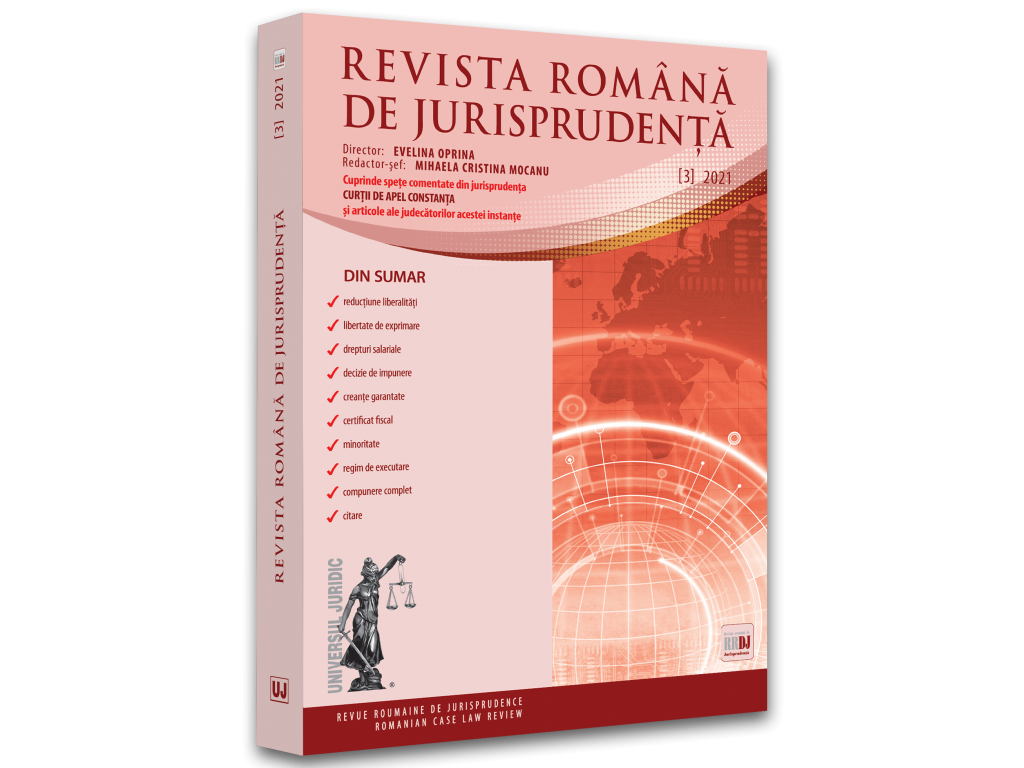Solutions to the case on appeal. Illegality of the judgment under appeal. Breach of the right to a fair trial. Referral of the case for retrial as a result of the failure to state reasons for the criminal judgment under appeal
DREPT PENAL ŞI DREPT PROCESUAL PENAL
Abstract
According to Article 408 para. 1 of the Criminal Procedure Code in relation to art. 38 para. (2) of the Criminal Procedure Code, against the criminal sentence pronounced by the Court may be appealed, which is judged by the court of appeal, a court of judicial review that has full jurisdiction in the resolution of the case as a whole.
The devolutive effect of the appeal, expressly regulated by the provisions of Article 417 of the Code of Criminal Procedure, must not be interpreted as requiring the court of judicial review to completely rehear the merits of the case, since this devolutive effect cannot be understood either as the production of all the evidentiary material, in the sense of a complete judicial investigation by the court of appeal, or as a substitute for the failure of the court to rule on particularly important aspects of the case.
An analysis of the judgment of the first court shows that, although it sentenced the defendant to three years' imprisonment with execution, it does not set out the reasons on which the judge based his conviction that the acts of which the defendant is accused exist, were committed by him and meet the elements of typicality laid down in the incriminating provision, even though those elements necessarily form the basis of any sentencing decision and also have effects on the civil action joined to the criminal action. Moreover, the judgment does not even address issues relating to the individualisation of the sentence, the method of execution or the resolution of the civil action. By proceeding in the manner described above, the first instance did not practically resolve the merits of the case in relation to the defendant.
This deficiency in the judgment of the first instance is covered by the case of relative nullity provided for in Article 282(1) in relation to Art. 401 and Art. 403 of the Criminal Procedure Code, which governs the content of the judgment by which the criminal court decides the merits of the case.
The sanction of relative nullity, in this case, is determined by the fact that the defendant's rights have been infringed, because in the absence of a statement of reasons for the judgment, neither the defendant nor the court hearing the appeal can understand the reasoning behind the decision or the arguments that formed the conviction of the judge at first court.
The evocation of the merits, even by replacing the total or partial absence of reasons for the judgment on appeal, could not satisfy the requirements of the right to a fair trial laid down in Article 6 of the Convention in situations where the principle of double jurisdiction applies.
From the point of view of the requirements of Article 6 of the Convention, it is obvious that the reasoning of the judgment constitutes one of the guarantees of the right to a fair trial, being proof of the transparency, the appearance of fairness and impartiality of the judge in carrying out the act of justice, so that in the absence of an adequate reasoning of the judgment of the trial judge, even the courts entrusted with the settlement of appeals cannot fulfil their task of verifying the legality and merits of the judgments which suffer for this reason.
The Code of Criminal Procedure established the system of double jurisdiction, the aim being to ensure a balance between the need for a legal and sound judgment (respecting the rights of the parties to a fair trial) and procedural speed.
Within this system of double jurisdiction, the appeal is the only ordinary remedy for reform, in which a new trial on the merits of the case is carried out from the perspective of judicial review.








